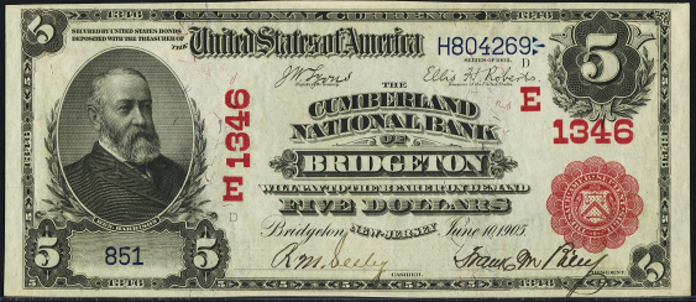Five Dollar Notes › Nationals › 1902 Five Dollar National Bank Notes › North Dakota Charters › 1902 $5 Marmarth North Dakota First National Bank
Get Value Now
| Item | Info |
|---|---|
| Series | 1902 |
| Charter | #9082 First National Bank of Marmarth, North Dakota |
| Year Chartered | 1908, 323 Banks Chartered |
| City Info | Marmarth is the largest city in Slope County in the U.S. State of North Dakota with a population of 143 as of 2014. It is situated in the southwestern part of Slope County, along the Bowman County-limits, in the southwestern part of North Dakota, just seven miles east of the state-border to Montana. Marmarth was founded as a railroad town along the Milwaukee Road from Seattle, WA to Chicago, IL, in order to develop a town for homesteaders. By its founding, the town population was over 5,000 people - mostly rail workers and cattle ranchers. Despite a population boom caused by the opening of the Little Beaver Dome oil field in 1936, the town population declined during most of the 21st century and had a population of only 143 in 2014. There is one restaurant and one bar still located in Marmarth in 2013. Source: Wikipedia |
| Similar Cities | City name is unique, no others like it. |
| Seal Varieties | Red, Blue |
| See Also | If your note doesn't match try: 1. 1907 $5 Legal Tender 2. 1899 $5 Silver Certificates |
| Other Info | 1. Value depends on notes known for charter, condition and market demand. |
| Neat Fact | Notes of Aldrich-Vreeland Period (1908-1915) contain inscription "Secured by United States bonds or other securities" (Friedbergs, 20th Ed. P 100) |
No Obligations Offers and Appraisals
Please submit a good photo or scan. It will be identified and evaluated. Understand there may be subtle differences between the image you see above and your note. Signatures, design, markings and note condition will determine the offer price. Notes in Uncirculated or better condition receive the best offers.
Appraisals can be estimated for wholesale and retail prices. Wholesale is what dealers typically pay. Retail is what a collector might pay. Retail is slightly higher in most cases.
Please visit this page for USA Paper Money Reference. Do not treat this page as a reference guide, it is for appraisal and acquisition purposes only.
